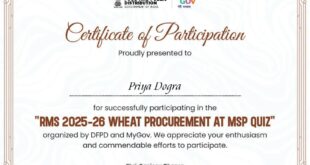Program 1: One Day Workshop on Lunar Remote Sensing and its Application
Note: JOIN MY WHATSAPP GROUP
About the Workshop:
The Moon provides an excellent opportunity to study the uninterrupted solar-terrestrial processes and serves as a unique laboratory for understanding the evolution of terrestrial planets. Its airless surface has recorded the 4.6 billion years of history of the solar system in its purest form. It has constantly been observed utilizing various remote sensors from Earth-based telescopes to highly sophisticated spacecrafts and advanced sensors. The past few decades of remote sensing aided by in-situ exploration of the lunar surface revealed by Apollo and Luna era provided critical inputs to characterize lunar surface and understand its evolution. These missions dramatically enhanced our understanding about the character and evolution of the solar system. Recently, high-resolution spaceborne imaging spectrometry in the visible and the near infrared has also contributed significantly to our current understanding of the geological, physical and chemical processes occurring over the planetary surfaces. Wealth of data acquired by the various lunar missions including Clementine, SMART-1, LRO, SELENE,
Chandrayaan-1 & 2 and Chang’E 1-5 has resulted in some new findings and discoveries, provided opportunities to study the Moon by the examination of new ideas and testing data analysis algorithms. The proposed workshop is planned to provide an overview of theory and techniques of remote sensing of the Moon and their applications in analyzing lunar surface characteristics and its geology with special emphasis to Indian lunar missions
Curriculum:
• Overview of Lunar Remote Sensing
• Reflectance spectroscopy and detection of endogenic water on the Moon: Examples from recent lunar Missions.
• Mg-Spinel Mineralogy on the Moon
• Recent advances in radar exploration of the Moon.
• Lunar South Pole Aitken basin – understanding mantle geochemistry remotely.
• Chandrayaan-2 Imaging Infrared spectrometer (IIRS): Some initial results for mineral analysis.
• Panel Discussion and Q/A session
Watch this out:
Also Read: Microsoft AI Classroom SERIES is live from April 26th – 28th 2021 ! Register now
Also: Guinness World Record Free Certificate | Python Free Course | AI for India 1.0 GUVI | AICTE
Target Audience:
The candidates who want to participate in the workshop should be a student of final year undergraduate course or postgraduate course (any year).Technical/Scientific Staff of Central/State Government/Faculty/researchers at university/institutions are also eligible to apply for this
course. Applications of participants have to be duly sponsored by university/institute and forwarded through coordinators from respective centres. Users receiving programmes under CEC-UGC/ CIET networks can also participate. Institutions on high speed National Knowledge
Network (NKN).
Workshop Funding and Technical Support:
The workshop is sponsored by Indian Space Research Organisation, Department of Space, Government of India.
Workshop Study Material:
Workshop study materials like lecture slides, video recorded lectures, open source software & handouts of demonstrations, etc. will be made available through eclass. Video lectures will also be uploaded on e-class
Workshop Registration:
• Workshop updates and other details will be available on URL- http://www.iirs.gov.in/Edusat-News/
• To participate in this programme the interested organizations/ universities/ departments/ Institutes has to identify a coordinator at their end. The identified coordinator will register online his/her Institute as nodal center in IIRS website.
• All the participants have to register online through registration page by selecting his/her organization as nodal center.
Google Career Certificate | Google Free Online Courses |Google Free Training
Award of Participation:
Working Professionals and Students: Based on 70% attendance.
Register Now
Program 2: Geospatial Technology for Archeological Studies
About the Course
The programme is sponsored by Indian Space Research Organisation, Department of Space, Government of India. Course Funding & Technical Support Natural disasters are becoming more frequent and intense across the globe. Geoinformatics, which includes Remote Sensing, Geographic Information System, Global Positioning Systems, and Internet Mapping Services, provides the most powerful technology for all phases of disaster management i.e. hazard mapping, monitoring, risk assessment, emergency response and reconstruction including early warning. The course is scheduled from April 05-16, 2021.
Curriculum:
- Geospatial Technology for Archeology: Tools and Techniques
- Space based remote sensing for archeological studies
- Ground based geospatial techniques for archeological/heritage studies
- Documentation of cultural heritage sites: Case examples
- Low altitude systems for archeological investigations
- Microwave Remote sensing for archeological studies: Space and Ground based
- Demonstration on Terrestrial Laser Scanner
- Space based studies for Landscape Archeology
- Advanced image processing based damage assessment of cultural heritage monuments
 Priya Dogra – Certification | Jobs | Internships
Priya Dogra – Certification | Jobs | Internships



